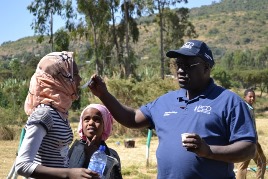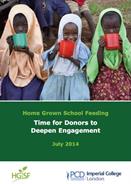National NTD Mapping Informs Ethiopia Deworming
 94% of 535 surveyed districts in Ethiopia are endemic for either schistosomiasis and/or soil-transmitted helminths (STH) – Neglected Tropical Diseases (NTDs) which are commonly found in school-children. This was one finding of the Ethiopian Public Health Institute who supported by Imperial College London’s PCD and SCI recently mapped NTD prevalence alongside Water, Sanitation and Hygiene infrastructure using data collected from 125,000 school-aged children across 2,700 schools. To date, the mapping surveys have informed school-based deworming programmes against STH in Ethiopia’s Oromia and Amhara regions and integrated schistosomiasis and STH campaigns will commence in these and other regions later in the year. Eventually, these campaigns will extend to all areas where children are at risk. Click to read more
94% of 535 surveyed districts in Ethiopia are endemic for either schistosomiasis and/or soil-transmitted helminths (STH) – Neglected Tropical Diseases (NTDs) which are commonly found in school-children. This was one finding of the Ethiopian Public Health Institute who supported by Imperial College London’s PCD and SCI recently mapped NTD prevalence alongside Water, Sanitation and Hygiene infrastructure using data collected from 125,000 school-aged children across 2,700 schools. To date, the mapping surveys have informed school-based deworming programmes against STH in Ethiopia’s Oromia and Amhara regions and integrated schistosomiasis and STH campaigns will commence in these and other regions later in the year. Eventually, these campaigns will extend to all areas where children are at risk. Click to read more
Home Grown School Feeding: Time for Donors to Deepen Engagement
 A new policy paper, “Home Grown School Feeding (HGSF): Time for Donors to Deepen Engagement” from Imperial College London’s PCD finds that despite the widespread benefits of HGSF felt in low and middle income countries, donor support to the initiative is significantly lacking. The paper outlines that as substantial challenges remain in meeting the global development goals on hunger, education and poverty, focusing attention on HGSF and other such innovative approaches which link agriculture, health and education sectors is crucial. The HGSF initiative can be described as a “win-win” – ensuring that food for school meals is locally grown, so that smallholder farmers are given a fixed income, and at the same time well fed children are more likely to learn, attend school and develop into healthy adults. Click to read more Charlotte Broyd Communications Officer Partnership for Child Development
A new policy paper, “Home Grown School Feeding (HGSF): Time for Donors to Deepen Engagement” from Imperial College London’s PCD finds that despite the widespread benefits of HGSF felt in low and middle income countries, donor support to the initiative is significantly lacking. The paper outlines that as substantial challenges remain in meeting the global development goals on hunger, education and poverty, focusing attention on HGSF and other such innovative approaches which link agriculture, health and education sectors is crucial. The HGSF initiative can be described as a “win-win” – ensuring that food for school meals is locally grown, so that smallholder farmers are given a fixed income, and at the same time well fed children are more likely to learn, attend school and develop into healthy adults. Click to read more Charlotte Broyd Communications Officer Partnership for Child Development